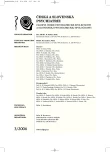Are Hyperkinetic Disorders a Myth?
Jsou hyperkinetické poruchy mýtem?
Hyperkinetické poruchy nejsou mýtem, ale diagnostickou kategorií F90, která se objevuje ve všech věkových skupinách - od dětství do dospělosti. Neurovývojové opoždění vytváří zátěžové životní situace vedoucí k vulnerabilitě jedince. Minimální organické poškození a kumulace zevních stresů vede k maladaptivnímu chování s vysokou psychiatrickou komorbiditou. Zobrazovací techniky vykazují poruchu regulace kortiko-striato-thalamo-kortikálního okruhu za přítomnosti téměř nulové pravolevé asymetrie. Úspěšná je terapie stimulancii, zvláště, je-li kombinována s kognitivně behaviorální terapií.
Klíčová slova:
hyperkinetické poruchy, etiologie, zobrazovací techniky, komorbidita, léčba.
Authors:
E. Malá
Authors‘ workplace:
Dětská psychiatrická klinika 2. LF UK a FN Motol, Praha
přednosta doc. MUDr. M. Hrdlička, CSc.
; Institut postgraduálního vzdělávání ve zdravotnictví, Praha
ředitel MUDr. A. Malina, Ph. D.
Published in:
Čes. a slov. Psychiat., 102, 2006, No. 3, pp. 142-148.
Category:
Comprehensive Reports
Overview
Hyperkinetic disorders do not represent a myth, but a diagnosic category F90, which develops in all age groups - from the childhood to adult age. A delayed neurovegetative development. Creates burdening situations in life, which results in vulnerability of the individual. Minimal organic damage and accumulation of externals stresses follow to maladaptive with high psychiatric co-morbidity. The imaging techniques show disorder in the regulation of cortico-striato-thalamo-cortical circuit with almost zero right-left asymmetry.
The treatment with stimulants proved to be successful, especially when combined with a cognitivebehavior therapy.
Key words:
hyperkinetic disorders, etiology, imaging techniques, comorbidity, therapy.
Labels
Addictology Paediatric psychiatry PsychiatryArticle was published in
Czech and Slovak Psychiatry

2006 Issue 3
- Hope Awakens with Early Diagnosis of Parkinson's Disease Based on Skin Odor
- Memantine in Dementia Therapy – Current Findings and Possible Future Applications
- Memantine Eases Daily Life for Patients and Caregivers
- Deep stimulation of the globus pallidus improved clinical symptoms in a patient with refractory parkinsonism and genetic mutation
Most read in this issue
- Sexual Orientation and Homosexual Experiences in Female Schizophrenic Patients
- Hypodynamic Syndrome in Abstinent Alcoholics
- Family Correlates of Depression
- Clinical Aspects of Suicidality
